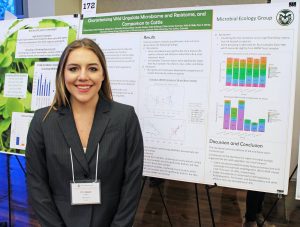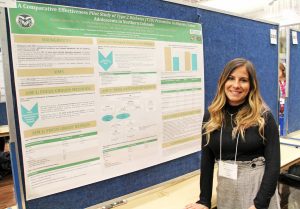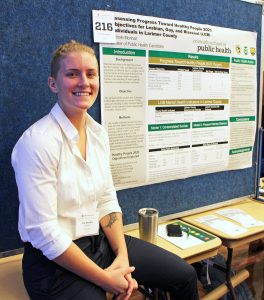
The pursuit of knowledge is not for the faint of heart. Just ask Grace Kuiper, whose research – recently presented at Colorado State University’s Graduate Student Showcase – involved collecting fecal samples.
Grace, a second-year MPH student in the Animals, People and the Environment concentration, worked with the Microbial Ecology Group in CSU’s Department of Clinical Sciences to collect fecal samples from ungulates (elk and bison) in Rocky Mountain and Yellowstone national parks, as well as soil samples. Sequencing the DNA from the samples and performing statistical analysis to cluster by species, park and matrix, and comparing those to samples from domestic cattle, she found greater microbiome diversity in the wild populations.
So, what does that mean? “Our agricultural practices are reducing resistance in cattle,” she explained, “so we really have to look at what that could mean for outcomes in food safety.”
Grace won a Great Minds in Research Award honorable mention at the showcase and was one of several ColoradoSPH at CSU students who presented their research.
Hillary Smith, a student in the Global Health and Health Disparities concentration, also was recognized for her research, winning a Global Research Award Top Scholar distinction. Her research focused on the metabolomics of dried blood spots from Malian infants to identify metabolites important for infant growth and immune development.

“I was inspired by both the challenge of the project and the impact on infant health globally that this research has,” Hillary said. “Metabolomics was not an area that I had any experience in before taking on this project so there was definitely a learning curve, but I enjoyed that process and applying what I’ve learned as a public health student to show the global impact of this work.”
For Natalia Sanchez, research led her to a population for whom Type 2 diabetes interventions are rarely tailored: Latinx adolescents. “It’s not just focusing on diet and exercise,” she explained. “There are psychosocial factors, immigration issues, cultural issues.” The intervention on which she worked included a curriculum that incorporated mindfulness exercises and community facilitation, as well as diet and exercise.
Nichole Monhait’s research assessed progress toward Larimer County’s Healthy People 2020 objectives for gay, lesbian and bisexual individuals, a particular concern, she said, since the 2020 U.S. Census is not going to ask about sexual orientation. “We know we don’t have the data but we do have disparity,” she said.

In Dana Sobel’s research into healthy activity and eating in Denver, she worked on a project that “ gives high school students a platform to identify issues within their community that they’d like to address as it relates to healthy food choices, physical activity, or community involvement,” she explained. “The ultimate goal is to help these students advocate for change in an effort to lower and mitigate childhood obesity.”
Selam Tewahde also conducted research related to childhood obesity, looking at the impact of the food environment relative to the physical activity environment on adolescent obesity. Analyzing data collected while working with Dr. Kaigang Li, she found “the built environment and its impacts on adolescent’s physical activity and obesity status to be very complicated. We hope to next look at more detailed data collected on a small sub-group of the subjects in our original analysis to see if that helps us better understand which, if any, parts of the built environment impact adolescent physical activity and obesity levels.”
The CSU Graduate Student Showcase is held annually to highlight research, entrepreneurship and creativity, giving graduate students a chance to connect with other graduate students and faculty at CSU, learn about other disciplines and gain conference experience.
